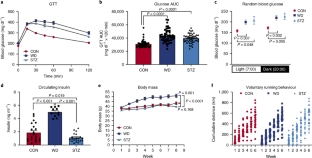2024-09-10 バージニア工科大学(VirginiaTech)
<関連情報>
- https://news.vt.edu/articles/2024/09/research_fralinbiomed_lessard_0904.html
- https://www.nature.com/articles/s42255-020-0240-7
高血糖は筋シグナル伝達の障害と運動に対する有酸素性適応に関連する Hyperglycaemia is associated with impaired muscle signalling and aerobic adaptation to exercise
Tara L. MacDonald,Pattarawan Pattamaprapanont,Prerana Pathak,Natalie Fernandez,Ellen C. Freitas,Samar Hafida,Joanna Mitri,Steven L. Britton,Lauren G. Koch & Sarah J. Lessard
Nature Metabolism Published20 July 2020
DOI:https://doi.org/10.1038/s42255-020-0240-7

Abstract
Increased aerobic exercise capacity, as a result of exercise training, has important health benefits. However, some individuals are resistant to improvements in exercise capacity, probably due to undetermined genetic and environmental factors. Here, we show that exercise-induced improvements in aerobic capacity are blunted and aerobic remodelling of skeletal muscle is impaired in several animal models associated with chronic hyperglycaemia. Our data point to chronic hyperglycaemia as a potential negative regulator of aerobic adaptation, in part, via glucose-mediated modifications of the extracellular matrix, impaired vascularization and aberrant mechanical signalling in muscle. We also observe low exercise capacity and enhanced c-Jun N-terminal kinase activation in response to exercise in humans with impaired glucose tolerance. Our work indicates that current shifts in dietary and metabolic health, associated with increasing incidence of hyperglycaemia, might impair muscular and organismal adaptations to exercise training, including aerobic capacity as one of its key health outcomes.
